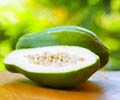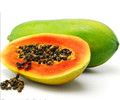Discover the incredible health benefits of papaya seeds, from detoxifying the liver to promoting a healthy gut. Here's why they are a superfood star!
- Papaya seeds are a rich source of vital nutrients that aid in liver detoxification and have potent antiparasitic properties
- They offer protection against renal diseases and serve as a natural contraceptive
- These seeds contain compounds beneficial for reducing inflammation in the body
Top 5 Reasons To Consume Papaya Seeds
Natural Detoxification:
Papaya seeds are believed to have a detoxifying effect on the liver. Thanks to their high content of the vital nutrient, saponin, these seeds can aid in liver cleansing, especially for people suffering from liver cirrhosis. Additionally, they can assist in the detoxification process, helping to flush out toxins from the body (1✔ ✔Trusted SourcePapaya improves non-alcoholic fatty liver disease in obese rats by attenuating oxidative stress, inflammation and lipogenic gene expression
Go to source).
Antiparasitic Properties:
One of the most notable benefits of papaya seeds is their potent antiparasitic and antimicrobial properties. They contain an alkaloid called "carpaine" that can kill intestinal worms and amoeba parasites, ensuring a healthier gut environment. In many cultures, papaya seeds have traditionally been used to combat intestinal parasites (2✔ ✔Trusted SourceEffectiveness of dried Carica papaya seeds against human intestinal parasitosis: a pilot study
Go to source).
Kidney Protection:
Papaya seeds might play a role in preventing kidney diseases. Research has suggested that the seeds can protect against renal failure by safeguarding the kidney from toxin-induced damage, making them a valuable addition for those looking to support their kidney health (3✔ ✔Trusted SourceNovel and classical renal biomarkers as evidence for the nephroprotective effect of Carica papaya leaf extract
Go to source).
Natural Contraceptive:
In traditional cultures, papaya seeds have been consumed as a natural contraceptive. Regular consumption can reduce sperm count in males without affecting libido, and this effect is temporary. Once the consumption stops, fertility returns to normal, making it a natural and non-intrusive method of birth control (4✔ ✔Trusted SourceCarica papaya seed extract slows human sperm
Go to source).
Anti-inflammatory Benefits:
Papaya seeds contain essential compounds like phenolic and flavonoid compounds, which have anti-inflammatory effects on the body (5✔ ✔Trusted SourceBeneficial Role of Carica papaya Extracts and Phytochemicals on Oxidative Stress and Related Diseases: A Mini Review
Go to source). This means they can help reduce inflammation in diseases like arthritis, asthma, and other inflammatory conditions.
Smart Ways to Incorporate Papaya Seeds in Your Diet
Incorporating papaya seeds into your diet is easy. They can be consumed raw, ground into a powder, or even blended into smoothies. But, as with any food, moderation is key. It's recommended to start with a small quantity and observe your body's reaction.Remember, while papaya seeds offer numerous health benefits, they should complement a balanced diet and not be relied upon as a sole method for health improvements. Before making any significant changes to your diet, especially if considering them for therapeutic purposes, always consult a healthcare professional.
References:
- Papaya improves non-alcoholic fatty liver disease in obese rats by attenuating oxidative stress, inflammation and lipogenic gene expression - (https://pubmed.ncbi.nlm.nih.gov/33815675/)
- Effectiveness of dried Carica papaya seeds against human intestinal parasitosis: a pilot study - (https://pubmed.ncbi.nlm.nih.gov/17472487/)
- Novel and classical renal biomarkers as evidence for the nephroprotective effect of Carica papaya leaf extract - (https://pubmed.ncbi.nlm.nih.gov/30206132/)
- Carica papaya seed extract slows human sperm - (https://pubmed.ncbi.nlm.nih.gov/31128152/)
- Beneficial Role of Carica papaya Extracts and Phytochemicals on Oxidative Stress and Related Diseases: A Mini Review - (https://pubmed.ncbi.nlm.nih.gov/33916114/)
Source-Medindia















